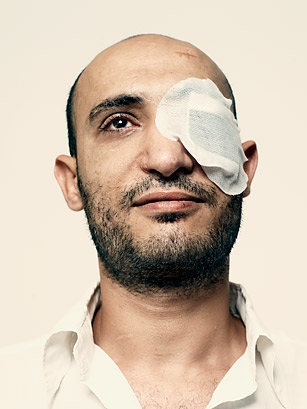
Ahmed Harara, 31, is a dentist. During the violent clashes that broke out between protesters and Egyptian security forces in Tahrir Square in January, he lost his eye to a rubber bullet. In November, he went back to the square, only to lose his other eye the same way. He spoke to TIME's Abigail Hauslohner about his sacrifices for Egypt's unfinished revolution.
TIME: What are you going to do about your injuries?
Ahmed Harara: I'm going to travel to Germany and Switzerland to operate on my eyes. There has been talk about transplants.
Will it work?
Everything is in God's hands. They say that transplants have undergone a revolution — why not? I will try, and if God wills, it will happen. It's still undergoing testing, but what I have been told is that it's like chips that are transplanted and the vision is black and white and there are prototypes, so why not, but I'm grateful whatever happens, whether I can see or not. That's why I cannot go to Tahrir. Doctors have prohibited it completely because the new tear gas causes optic-nerve inflammation. Two friends got optic-nerve inflammation and blurred vision for a while from the new gas, which I think is made in U.S.A. ...
If God wills that I start to see again, I will look for office work. If not, I will learn braille and look for any appropriate job. I cannot stay home without work. I was going to work at al-Ahly Bank, with one eye, as I have applied and was accepted. But now my other eye is gone. But I don't think that just because I was injured in my eyes, I should stay home and not move and wait for someone to feed me and give me money without me doing anything. It's not something that should be done.
What event made you an activist? What made this a personal thing for you?
Before the revolution, it [my level of political involvement] was mainly talking with my friends, saying that the the current situation is not okay, that the poor are getting poorer and the rich are getting richer. We said it aloud in local cafés but never participated in protests or did anything about it. On Jan. 25, I didn't join protests, because they were mainly calling for the ousting of Habib El Adly [the Interior Minister] and to end the state of emergency, as well as raising minimum wage, and I didn't see that changing one minister for another within the same system would make a difference. But when I saw on Facebook the words "The people want the fall of the regime," I went down there on the 26th. There wasn't much action. We were chased and hit — on the 27th too. And on the 28th we found out that people would gather in Mostafa Mahmoud [a mosque in the Cairo neighborhood of Mohandisseen, across the river] so we went there. I felt that that was the first day the entirety of Egypt took to the streets due to the state of extreme anger at the regime. I was hit on the 28th, and I was injured severely with shotgun pellets. There were 64 injuries in my face, six in my neck and four in my lungs that caused internal bleeding, and I had to stay home to rehabilitate. But the minute I could function normally, Tahrir was the place to be, so I joined the protests for trying Mubarak or the cleansing of the police, state media, the judiciary. I started talking to politicians and gaining experience. Before that I wasn't interested in politics beyond talking about the current conditions within my circle of friends.